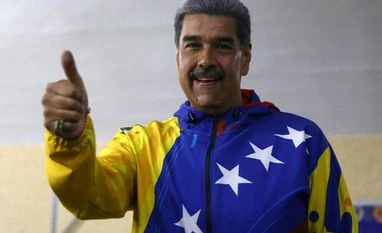Authoritarian leader Nicolas Maduro has been declared the victor in Venezuela’s presidential election for a third consecutive term, sparking immediate protests from opposition supporters and concerns about the integrity of the voting process.
The announcement, made by Elvis Amoroso, head of the National Electoral Council, revealed that Maduro secured 51 per cent of the vote, while his main opponent, Edmundo Gonzalez, garnered 44 per cent.
These results are based on 80 per cent of voting stations, marking an irreversible trend according to Amoroso. However, the official voting tallies from each of the 30,000 polling centres have yet to be released, casting doubts on the transparency of the process.
Venezuela 2024 elections: Concerns on voting irregularities
The election process was marred by significant irregularities, with many voters protesting at polling centres as the results were announced.
Venezuela operates with two vote counts: A digital tally managed by the National Electoral Council, led by a Maduro ally, and a paper count printed by each voting machine at polling places.
The paper counts are crucial for citizens to verify the digital results. However, this year, officials at several key stations, including the Rafael Napoleon Baute school in Caracas, refused to hand over the paper tallies to election monitors. Similar issues were reported in Maracaibo, where local leaders struggled to obtain paper counts from all voting centres.
This lack of access to paper tallies has hindered the opposition’s ability to verify the announced results, leaving the nation without a reliable method to confirm the ruling party’s victory. The delay in announcing the results, six hours past the scheduled closing of polls, further indicated internal conflicts within the government regarding the election outcome.
More From This Section
The opposition, led by Gonzalez, had been optimistic, with early reports from their representatives at 30 per cent of voting centres suggesting a significant lead for Gonzalez. Despite purported exit polls, which are illegal in Venezuela, showing a strong preference for Gonzalez, Maduro’s supporters refused to concede defeat.
US concerned with Venezuela election results
The election was closely monitored by the international community, particularly the United States, which has been vocal in its opposition to Maduro’s regime. US Vice President Kamala Harris expressed support for the Venezuelan people, stating that their will must be respected. This stance comes after years of US-imposed sanctions aimed at pressuring Maduro out of office.
Following the announcement of the election results, signalling Maduro’s victory, US Secretary of State Antony Blinken said that the outcome did not reflect the vote of the people.
“We’ve seen the announcement just a short while ago by the Venezuelan electoral commission. We have serious concerns that the result announced does not reflect the will or the votes of the Venezuelan people,” Blinken said.
“It’s critical that every vote is counted fairly and transparently, that election officials immediately share information with the opposition and electoral observers without delay and that the electoral authorities publish detailed tabulation of votes,” he said.
Venezuela 2024 elections: 25 years of single-party rule
The election marks a critical moment for Venezuela, which has been under single-party rule for 25 years. Maduro, seeking a third term, faced an unexpected challenge from Edmundo Gonzalez, a retired diplomat who emerged as the opposition candidate just months before the election. The election process saw high voter engagement, with citizens lining up at polling centres before dawn and sharing refreshments as they waited to cast their votes.
The prolonged delay in closing some polling centres, with reports indicating they remained open nearly six hours past the deadline, added to the tension. The opposition has called on the National Electoral Council to start counting ballots immediately to address the growing concerns about the election's legitimacy.
Maduro and Gonzalez’s election campaigns
Both Maduro’s and Gonzalez’s campaigns highlighted different visions for the future of Venezuela. Maduro’s rallies were characterised by lively music and aggressive rhetoric against his opponents, while Gonzalez’s events inspired chants for freedom and saw emotional displays of support from the public. The contrasting campaign styles underscored the deep political divide within the country.
Venezuelans consider emigration on Maduro’s win
An April poll by Delphos, based in Caracas, indicated that about a quarter of Venezuelans were considering emigration if Maduro were to win. With 7.7 million Venezuelans having already left the country in recent years, primarily for destinations in Latin America, the Caribbean, and increasingly the US, the election’s outcome could exacerbate this trend.
As Venezuela awaits the official confirmation of the election results, the nation stands at a crossroads, with the potential for significant political and social change hanging in the balance.
)